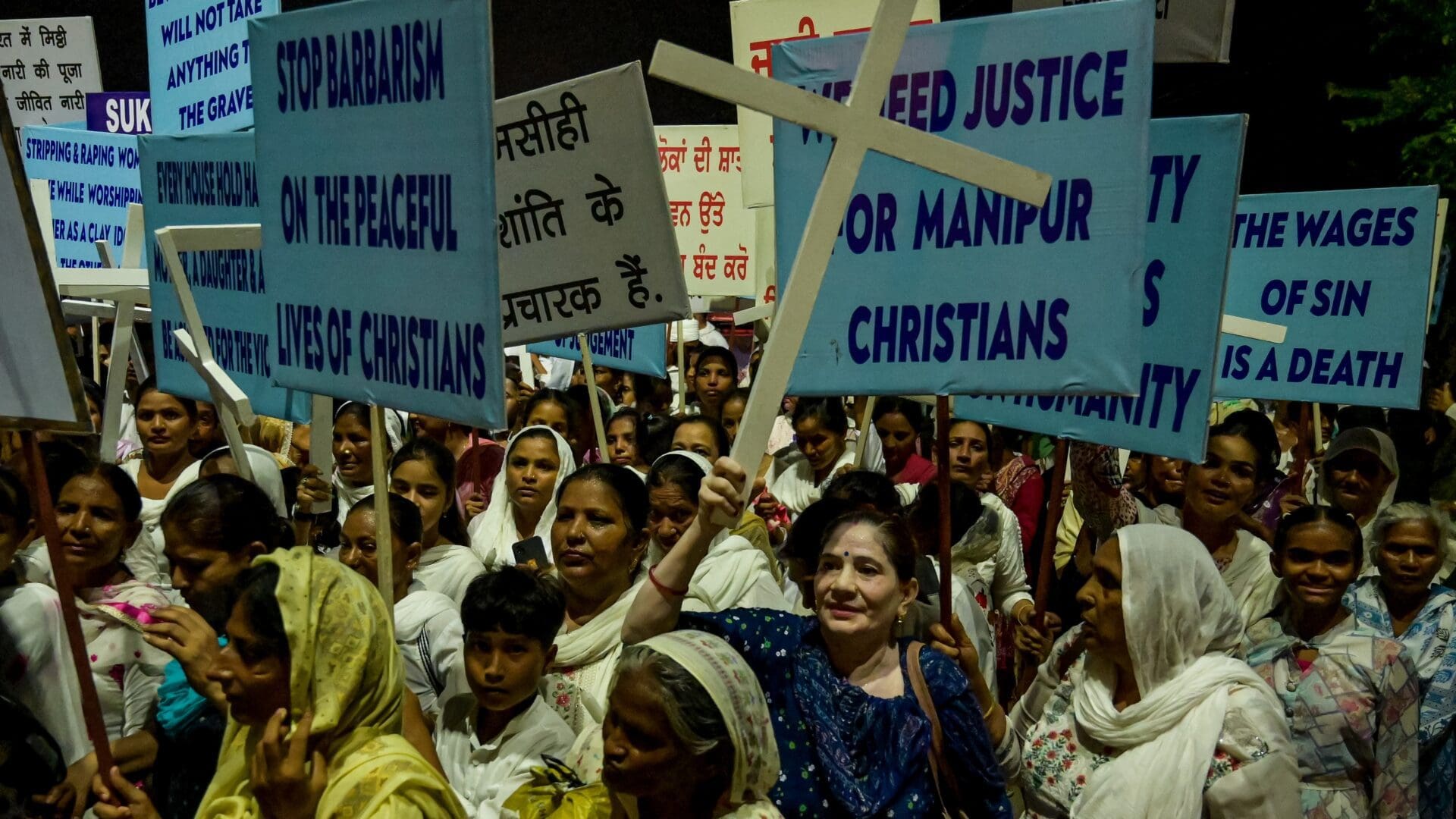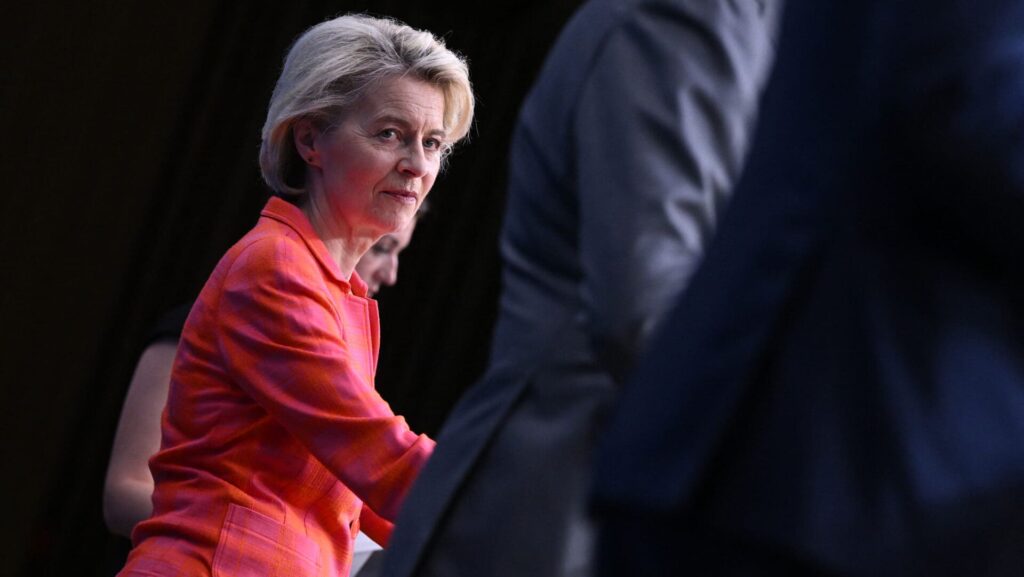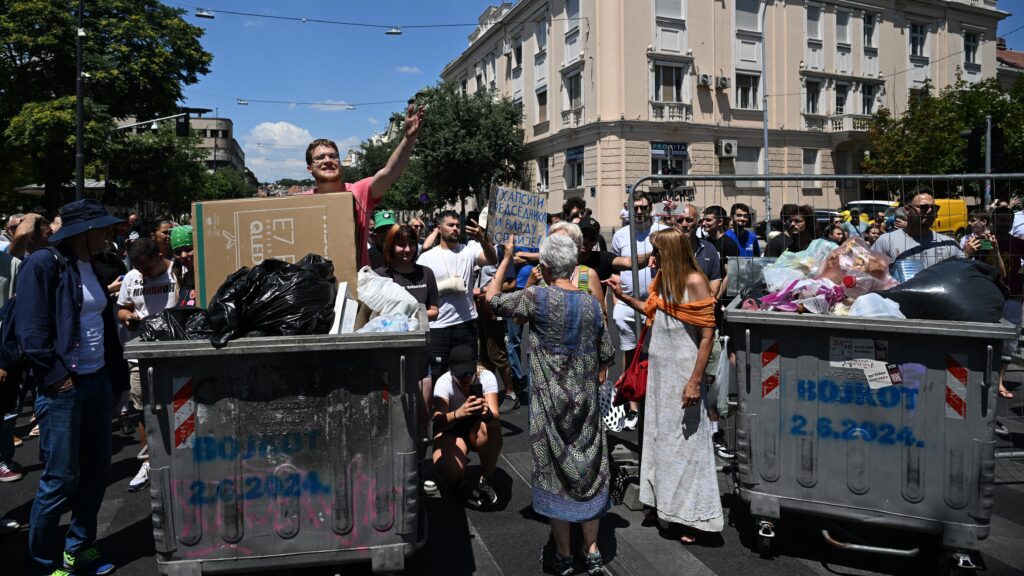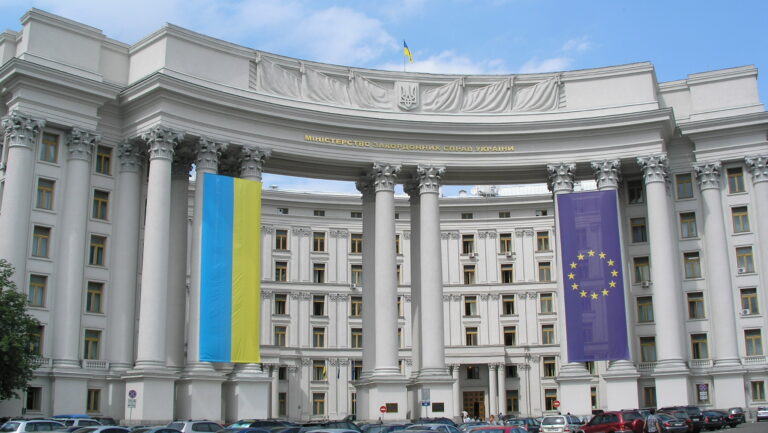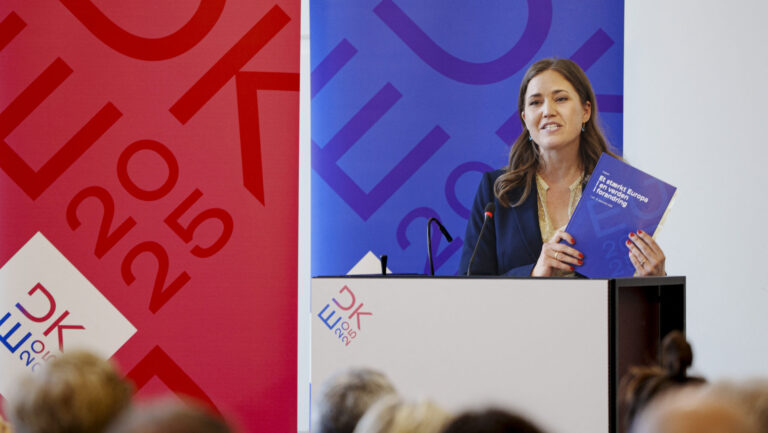A recent viral video showing a horrific sexual assault in India raised the world’s attention to the violent ethno-religious conflict going on since May 2023 in Manipur, India, between the state’s majority Hindu Meitei community and the Christian Kuki population. The video showed two Christian women, one in her 20s and the other in her 50s, being dragged from a police van by a mob from the Meitei tribe before being stripped naked and gang-raped. The younger woman’s brother and father who tried to protect the women were lynched by the Meitei mob. The incident happened two months ago, at the beginning of the violent conflict, but has only become widely known after the state government partially lifted an internet ban.
A one-mile highway in the lush green foothills of Manipur has become the symbol of a vicious sectarian conflict that has claimed over 180 people’s lives since the beginning of May. The conflict has seen the direct targeting of religious symbols, places of worship and refuge as more than 250 churches of different denominations have been burned down or damaged across the state. Since the clashes began, thousands have been injured, more than 60,000 have been displaced due to the violence, and more than 12,000 have fled to the neighbouring Mizoram state. According to data reviewed by Reuters, of the 181 victims, 113 are Kuki and 62 Meites. According to government estimates, 2,780 weapons stolen from the state armoury, including assault rifles, sniper guns and pistols, remain with the Meitei, while the Kukis only have 156 self-defence tools.
The viral video not only raised the media’s attention but
forced the Indian government and police to break their silence on the violent clashes and act.
The Indian police have been accused of refusing to assist those in the Kuki community who have been attacked and have not investigated reports of rape, torture and violence against Kukis. It wasn’t until the video became public that the police arrested four Meitei men—more than 70 days after the attack.
Under the Modi Government, Pressure on Indian Christians has Risen Dramatically
The Indian Prime Minister, Narendra Modi, also broke his silence and said that ‘what happened to the daughters of Manipur can never be forgiven,’ and that the ‘entire country had been shamed by the incident’. However, Prime Minister Modi has faced criticism for not addressing the broader conflict and for not referencing those those who have died in the clashes. As an article in The Guardian pointed out, some allege that the Hindu nationalist Modi government is not stepping in to protect the Kukis, who are Christian, from the Meitei, who are Hindu.
The allegations aren’t unfounded, as according to the 2023 World Watch List compiled by Open Doors, India is the 11th most dangerous country for Christians in the world. The report emphasises that there has been a significant increase in the ideology of Hindutva, which believes only Hindus are true Indians and that Christians, Muslims and other religious minorities have ‘foreign’ roots and must be expelled. The report also states that Hindu extremists seem to be able to attack others with impunity, even using extreme violence in some parts of the country, which is exactly what is happening in the Manipur conflict. The report added that pressure on Christians in India has risen dramatically since the current government under Prime Minister Narendra Modi came to power in May 2014 (and was re-elected with an even greater mandate in May 2019).
As Christianity Today highlighted, while the Indian government has an official legal framework for helping communities displaced by natural disasters and development projects,
it has none for assisting those displaced by violence or manmade conflict.
The article pointed out that the Modi government’s response has varied widely depending on public sympathy for the victims, media attention, and protests by those affected. Therefore, rehabilitation, including providing permanent shelter, jobs, and education, remains a significant challenge for the government and the church.
As reported in the Telegraph India, Kae Haopu Gangte, general secretary of Kuki Inpi Manipur, an umbrella Kuki civil society group, blamed the conflict on what he said was the desire of the Meiteis to dominate Kuki land. ‘The Kukis now want a separate state within India,’ Gangte said. ‘Until and unless we achieve statehood, we will not stop,’ he said. ‘We are fighting not only Meiteis, we are fighting the government.’
‘We are concerned about the events in Manipur, the violent ethnic clashes and the serious, serial human rights violations.’
Fidesz MEP Kinga Gál
Christian Kuki Tribe Fear Losing their Land, Homes and Jobs
Manipur is a state in northeast India with a population of around three million which is now divided into exclusive ethnic zones, with the dominant, largely Hindu Meiteis concentrated in the valley where the state capital sits, while the mostly Christian Kukis living in the surrounding hills. Within Manipur, nearly equal numbers of residents (41 per cent each) practice Hinduism and Christianity. But while the Hindus are largely Meitei, the Kuki and other tribals make up the majority of the Christians.
As The Guardian article noted, India’s north-eastern states have a history of ethnic rivalries dating back to before the country became independent in 1947. There have been several instances of violence between the Meitei and Kuki communities in Manipur in the past.
The current tensions are partly due to the policies of the Meitei-controlled state government, which has been accused of being discriminatory against the Kuki tribe. These policies include forced evictions that threaten the security of Kuki lands and attempt to portray them as illegal immigrants. The court ruling in March 2023 that granted the Meitei tribe ‘scheduled tribal status’ has added fuel to the fire. This status gives Meiteis the same economic benefits and quotas in government jobs and education as the majority Kuki tribe. Additionally, according to the new status, Meiteis are allowed to buy land in the hills where the Kukis predominantly live. This has caused the Kukis to fear losing their lands, homes, and jobs.
Out of these fears, Kuki student groups prompted protests against the ruling, which were met with violence and, by early May, escalated into violent attacks from the Meitei community on the Kuki tribe. In Manipur’s capital, Imphal, Meitei mobs began targeting and attacking Kuki homes and those who tried to flee the city for the hills, where they control much of the land. Kuki villages were also burned to the ground by Meitei militias numbering in their hundreds, sometimes thousands.
The Violence Shattered the Kuki Community
As Christianity Today reported, the violence shattered Kuki tribal Christians, and it’s more and more likely that those forced to escape Manipur won’t be able to return to their homes. The article illustrated the difficult situation Christians are facing in Manipur as a result of the violent clashes with the story of Lun Tombing, who was hiding in the bushes with her husband and their three-and six-year-old daughters when in May, they saw a mob burn down their home, and set their car and the church on fire. Tombing and her family had heard reports of mob violence in and around Imphal, the capital city of Manipur, where they live, and fled to their church.
Over 50 Christians hid in the building while a Hindu mob vandalised its outside.
When the attackers briefly drove away, the Christians ran for it. Tombing said that ‘with every burning of a vehicle, the mob would clap their hands and shout victory-shouts, as we witnessed all this while trembling behind the bushes, constantly afraid of being discovered’.
The family and other locals stayed outside for nearly 12 hours, only narrowly avoiding a confrontation with the rioters.
When the military finally arrived half a day later, they sent the survivors to a local refugee camp. Several days later, the traumatised family and hundreds of other Manipur Christians arrived at the nation’s capital with little more than medicine for the children and some extra clothes. ‘Even after we reached Delhi, whenever my daughters heard a bang or a sudden noise, they would start to scream, “Mummy, they are coming,”’ Tombing said.
Hungarian EP Representative: ‘Hungary is Concerned about the Serious Violations of Human Rights in Manipur’
In her Facebook post, the Hungarian European Parliament’s representative, Kinga Gál, expressed the Hungarian government’s concern about the Manipur conflict. In her post, she wrote: ‘In my statement, I indicated that we are concerned about the events in Manipur, the violent ethnic clashes and the serious, serial human rights violations. Christians living in the Indian state of Manipur—in a socially and economically vulnerable situation—are persecuted because of their religion and don’t receive meaningful help from the international community. Every year, more than a quarter of a billion Christians worldwide are persecuted or discriminated against because of their faith, and the number is increasing yearly. Hungary was the first in the world to launch a program to help persecuted Christians, within which tens of thousands of troubled Christians were helped to stay in their homeland or return home in many countries around the world.’
The European Parliament recently voted in favour of a resolution which called on the Indian government to repeal the Armed Forces Special Powers Act (AFSPA) and prioritise human rights in its dialogue and relationship with India. The resolution also asked the Indian government ‘to protect all religious minorities, such as Manipur’s Christian community, and to pre-empt any further escalation.’ It also calls on authorities to grant unhindered access to the area by journalists and international observers and to end Internet shutdowns. Instead of admitting the government’s negligence and promising to do everything to protect Christians and other religious minorities, the Indian leadership called the EU legislature action unacceptable.

